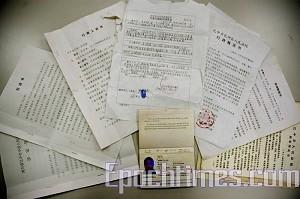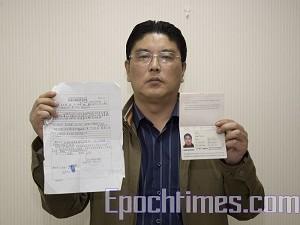On December 27, mainland human rights advocator Wu Yalin arrived in Taipei, Taiwan via Thai Airways PG636. It is reported that Taiwan’s Mainland Affairs Council is contemplating whether to grant Wu political asylum. The prospect is not optimistic.
Wu, who was sentenced to nine years imprisonment before, said that he was recently sentenced to three years in labor camp for spreading the book, Nine Commentaries on the Communist Party and making human rights appeals. He was forced to flee.
Wu revealed that through the Chinese human rights Web site, 64 Tianwang, people from his home town told him that the Chinese Communist Public Relations Department had issued arrest warrants on the charges that he “colluded with overseas anti-China forces to subvert the government.”
Wu called upon the outside world to pay attention to his predicament and hoped the Taiwan government would grant him political asylum.
Three Years in Labor Camp For Passing Three Copies of the Nine Commentaries
When Wu was interviewed by The Epoch Times, he talked about the reason for his escape. He said that there were Falun Gong practitioners distributing the Nine Commentaries on the Communist Party in a local area in Sichuan province. After reading it, he felt it was good and factual, so he passed three books to his friends. Little did he expect the information to be given away.
In November, Wu’s friend in the police department told him that the Bazhong City Commission had unofficially determined to send him to labor camp for three years. One of the charges was so-called spreading Falun Gong’s anti-revolutionary materials (the Chinese Communist Party claims itself to be revolutionary). Other charges included being in contact with the 64 Tianwang Web site and for several appeals that “disturbed the law and order of Beijing.”
As for being sent to labor camp for three years for dispatching the Nine Commentaries, Wu said that the persecution of Falun Gong was very serious in Sichuan province. To his knowledge, a female practitioner, the wife of a middle-rank member of the communist cadre, often went to local district public areas, such as Joyful Harvest, to distribute Falun Gong truth-clarifying materials and called on people to withdraw from the communist party. She was sent to the labor camp twice. In November 2007, the Chinese Communist Party (CCP) arrested her and sentenced her to five years in prison.
Wu said, “I am not a Falun Gong practitioner, but I don’t agree with the suppression of Falun Gong. Falun Gong improves one’s physical health. What is bad about it? But the CCP just can’t tolerate it.”





